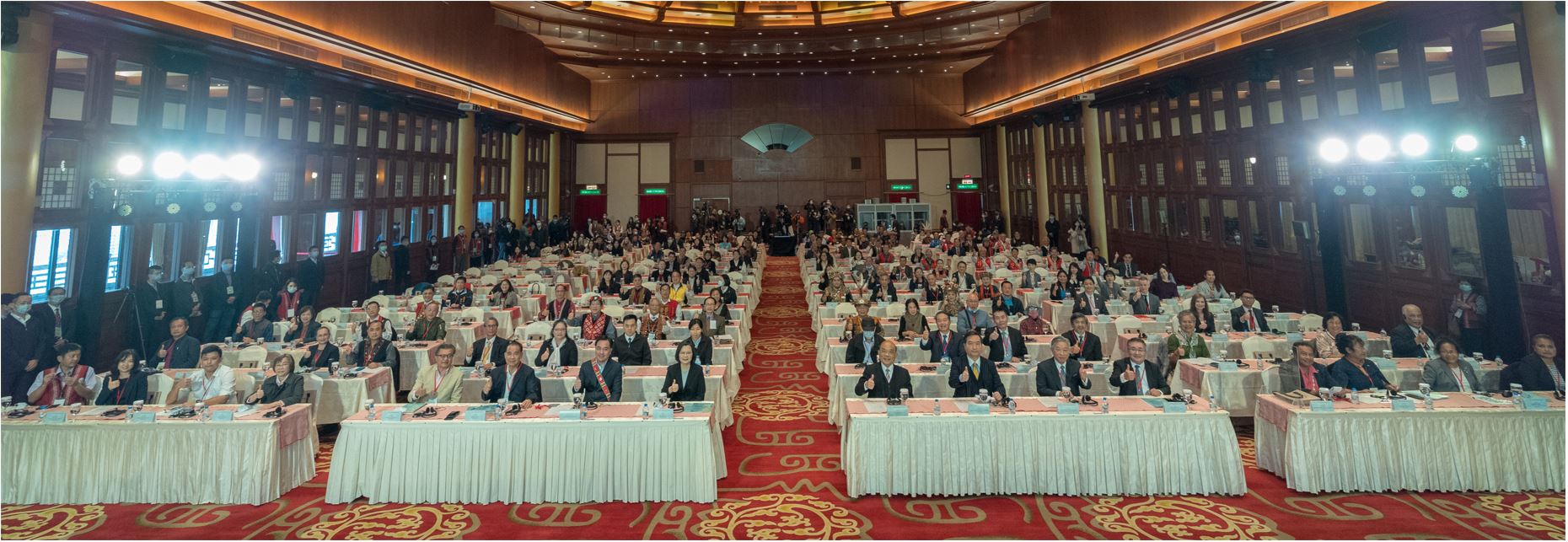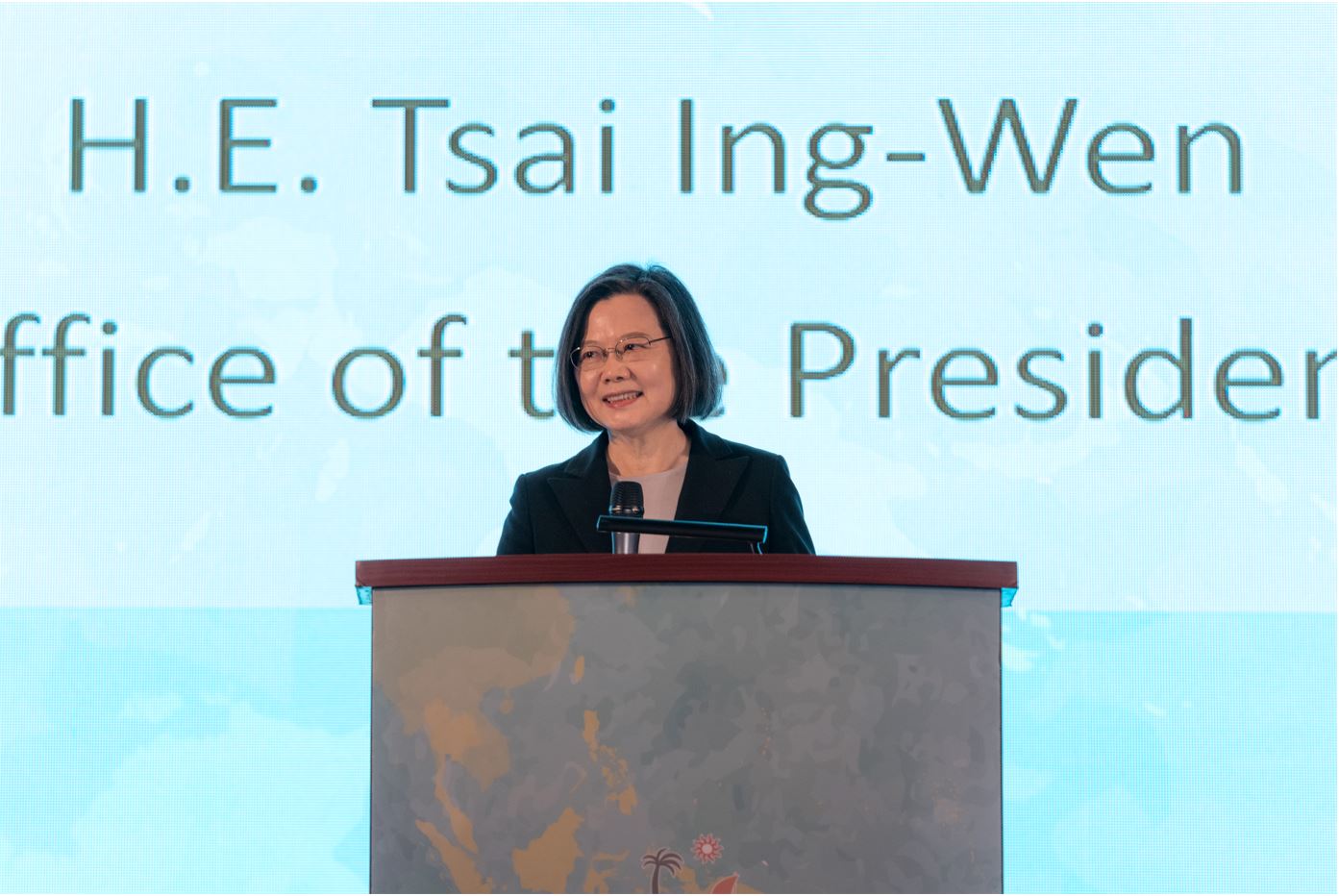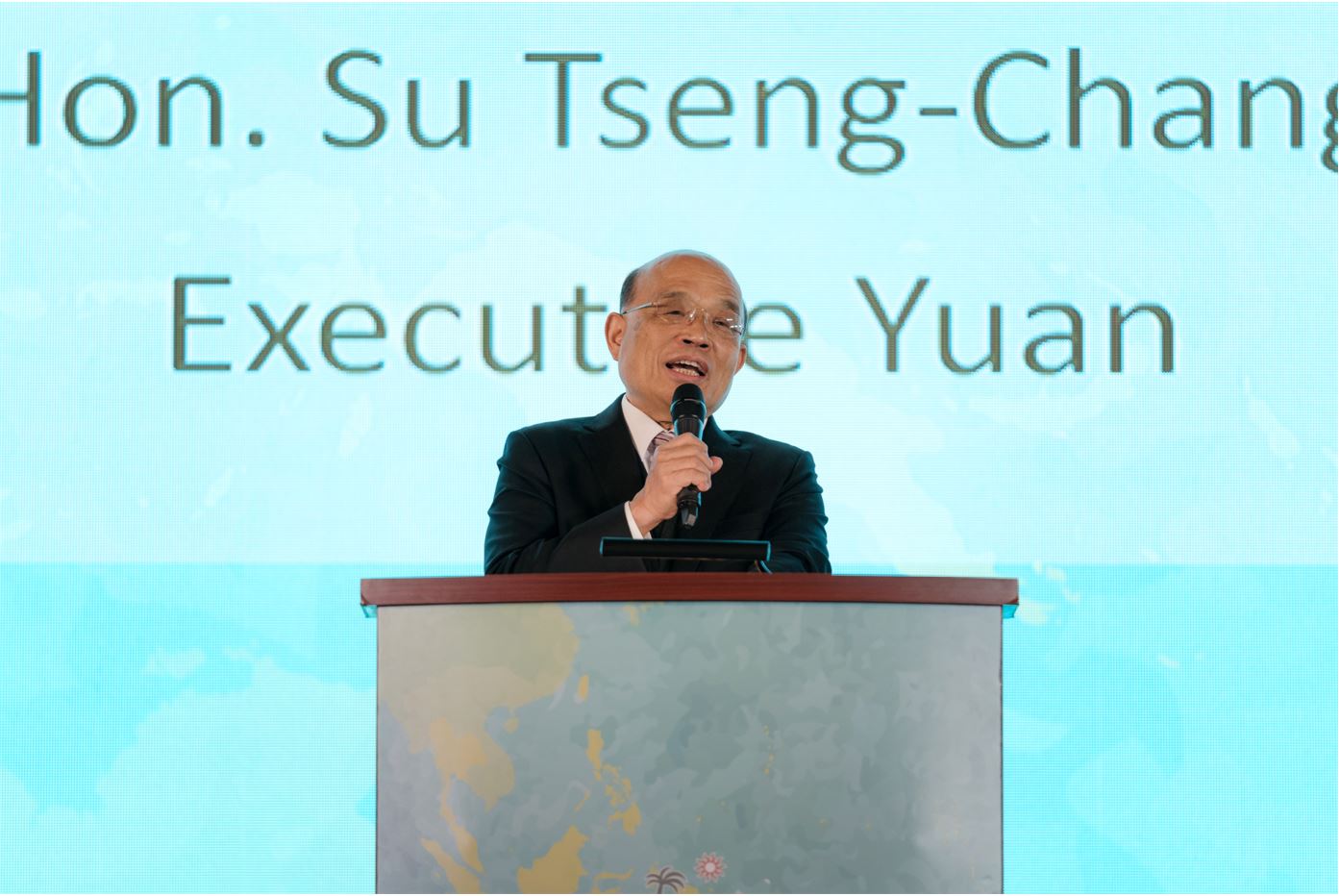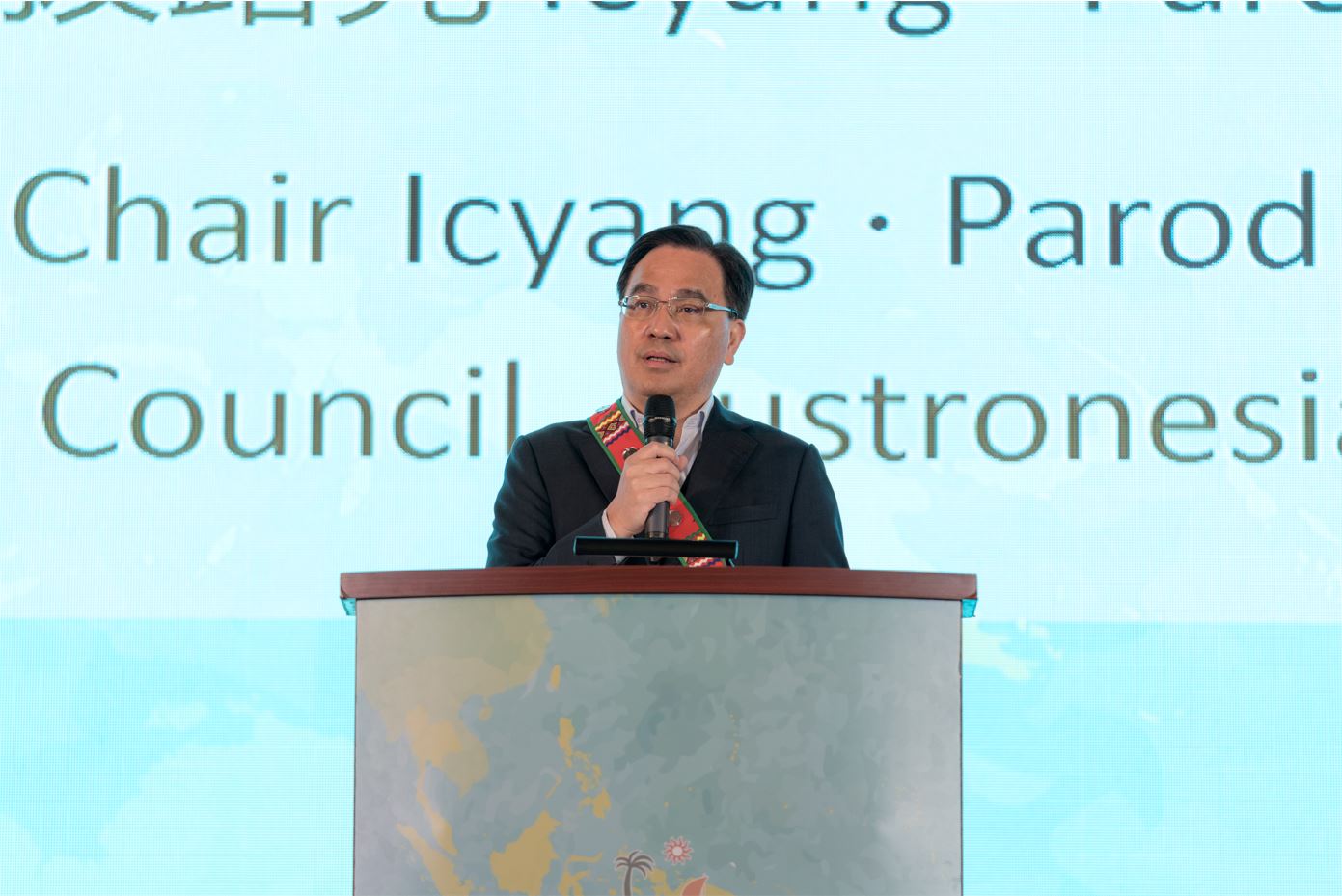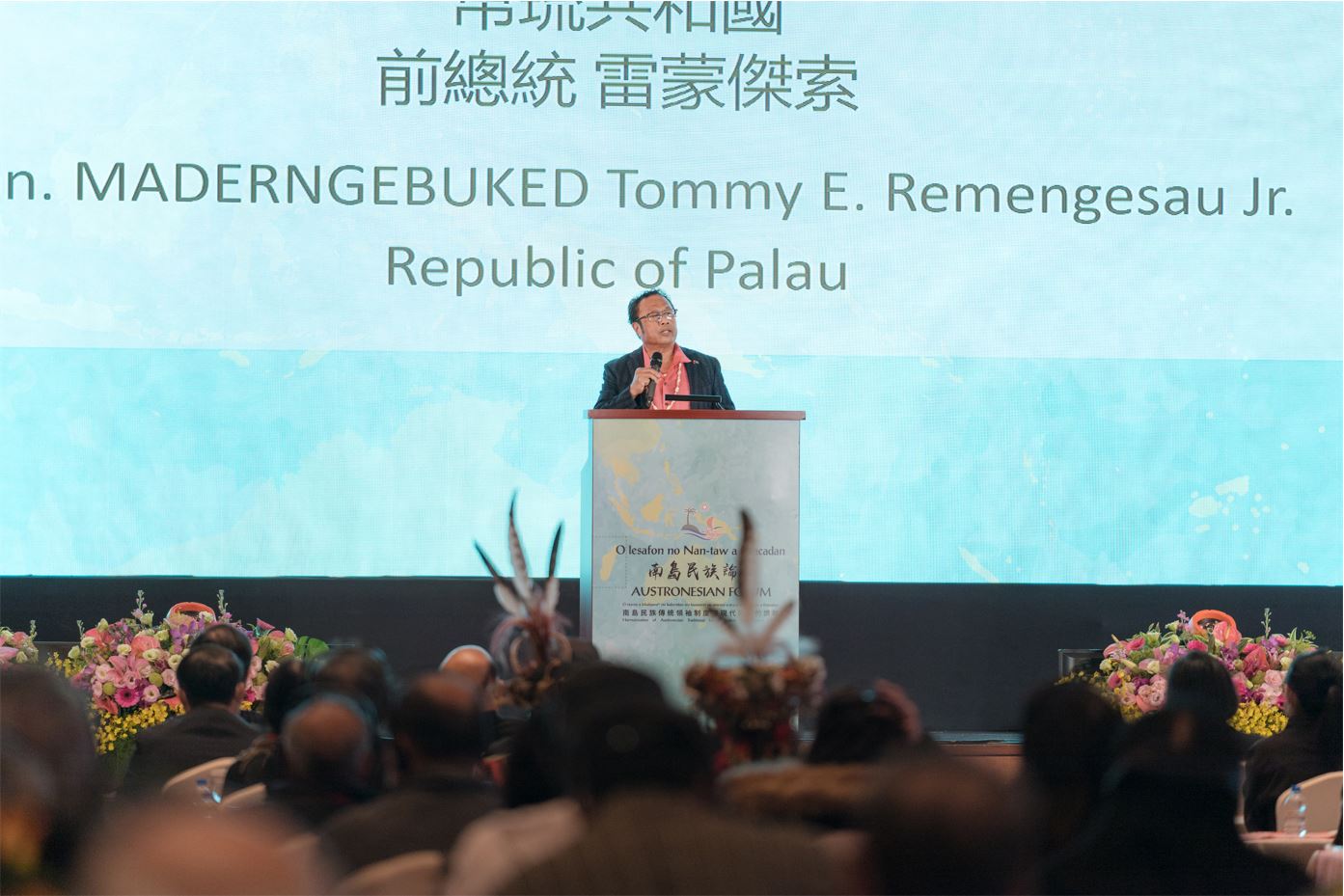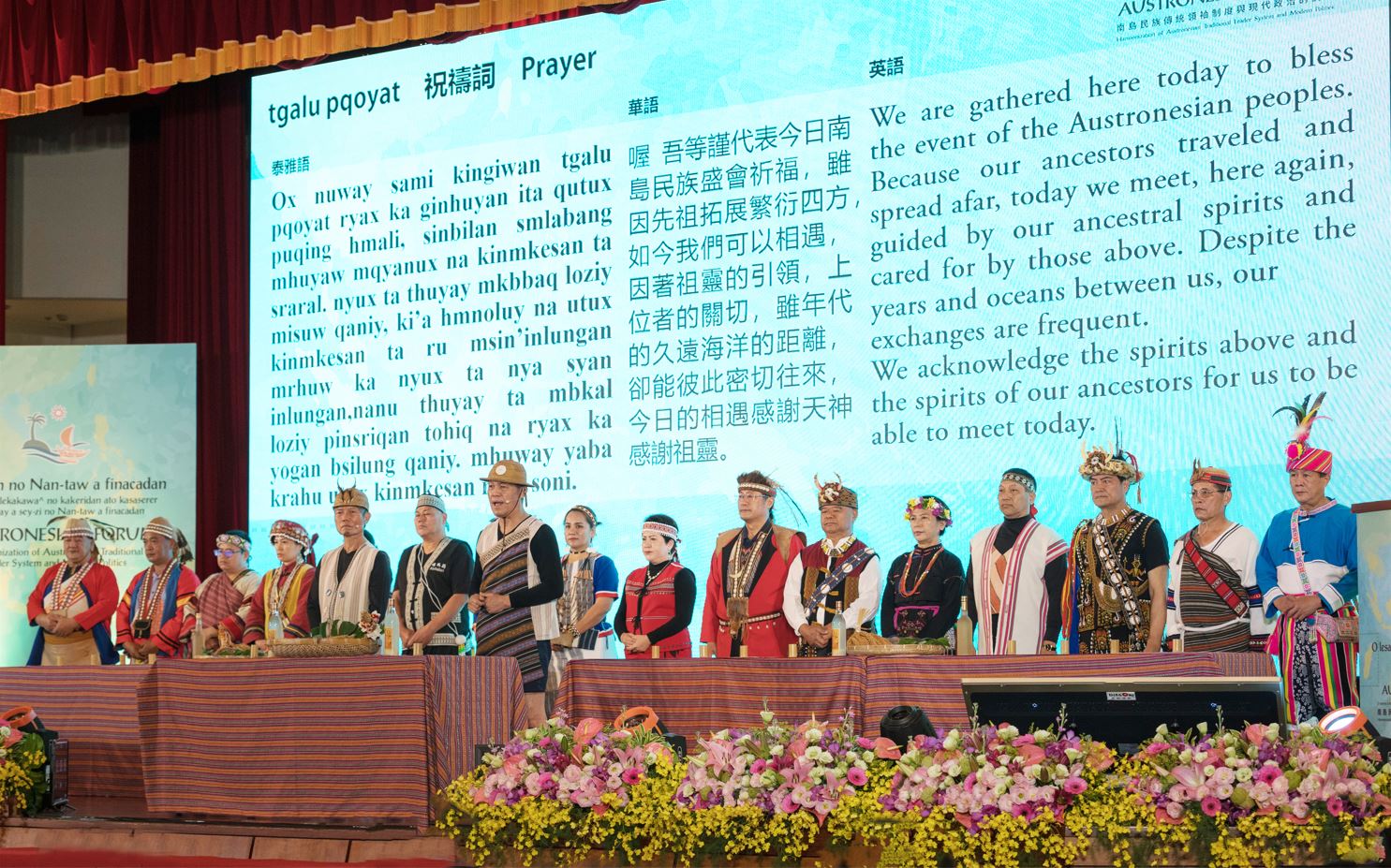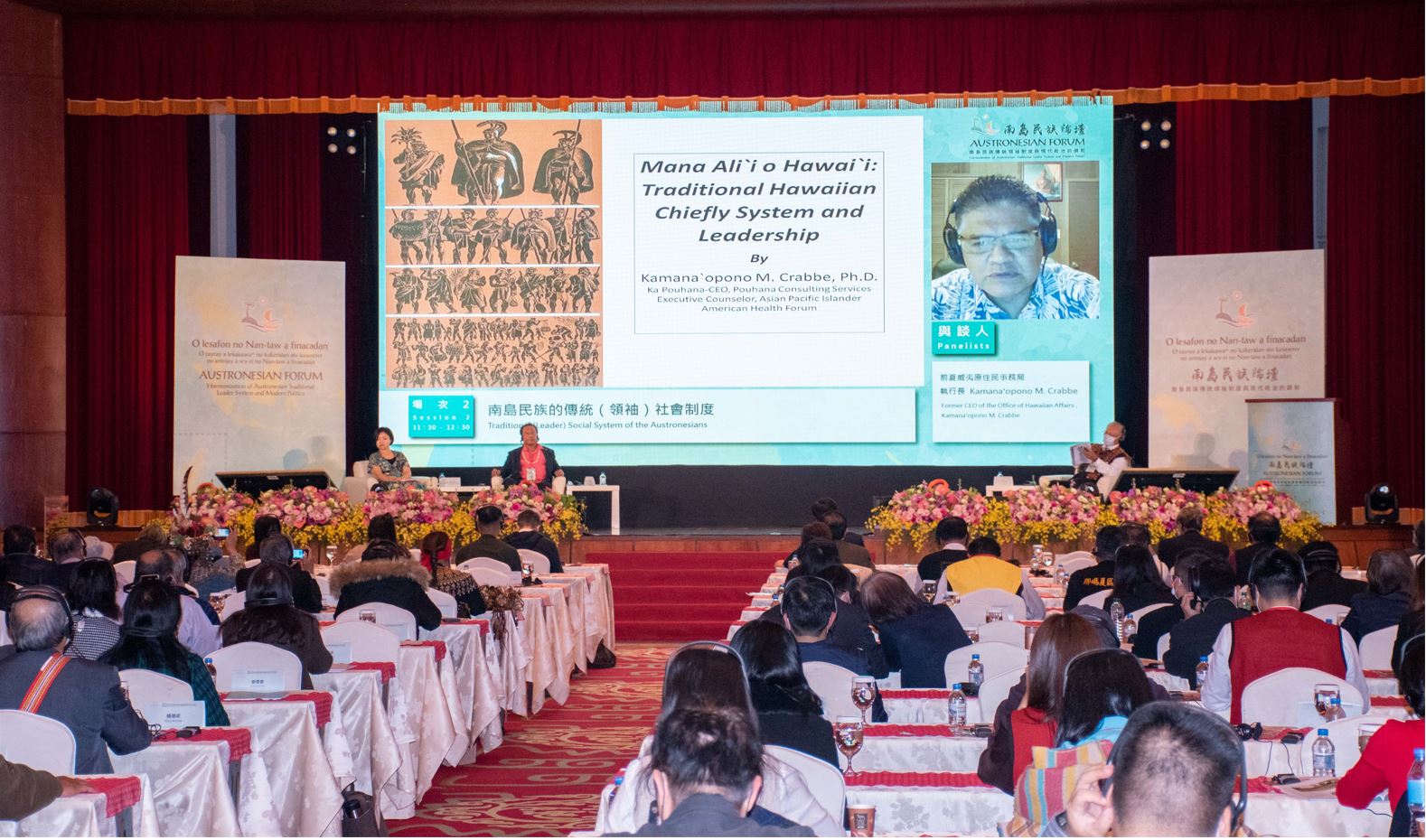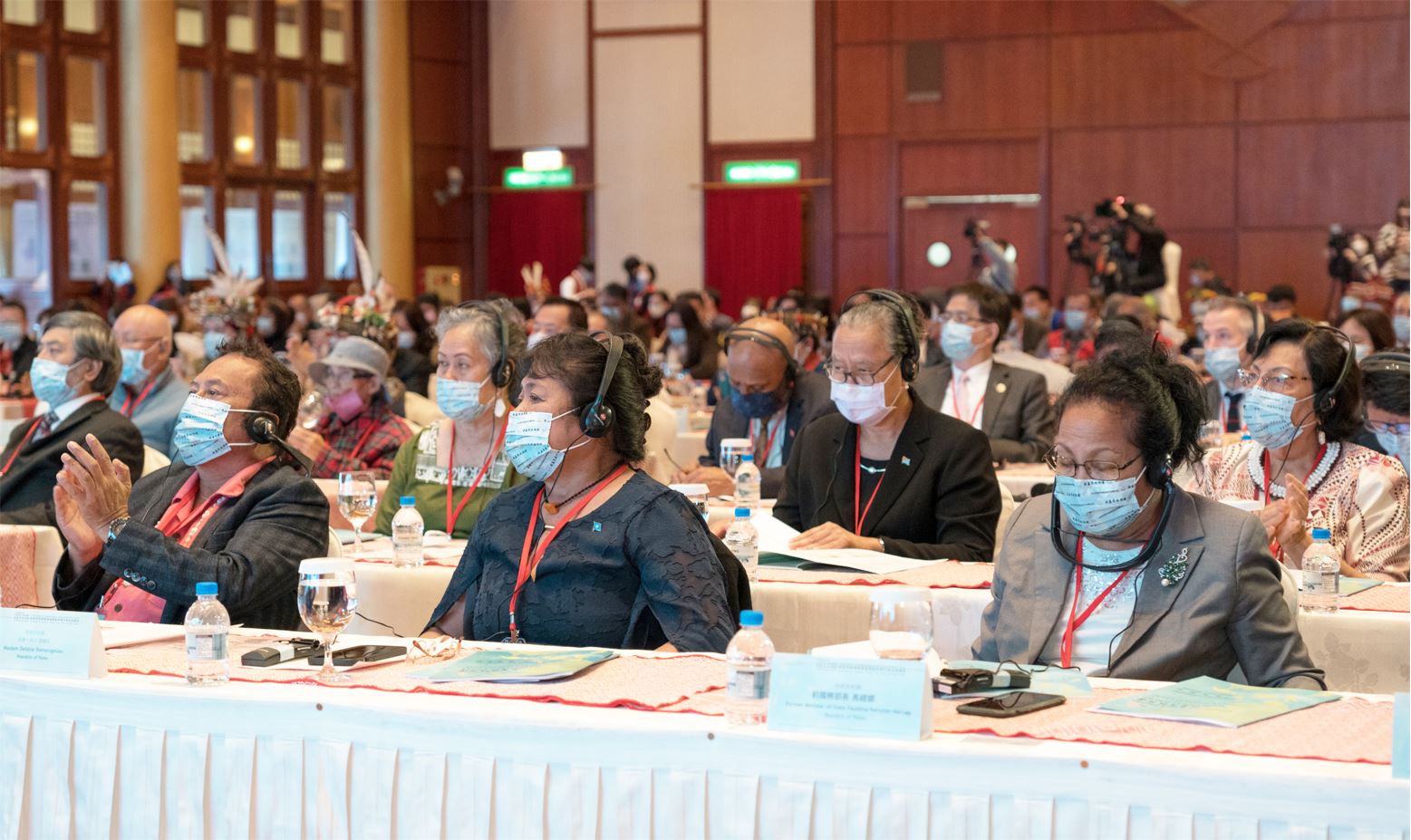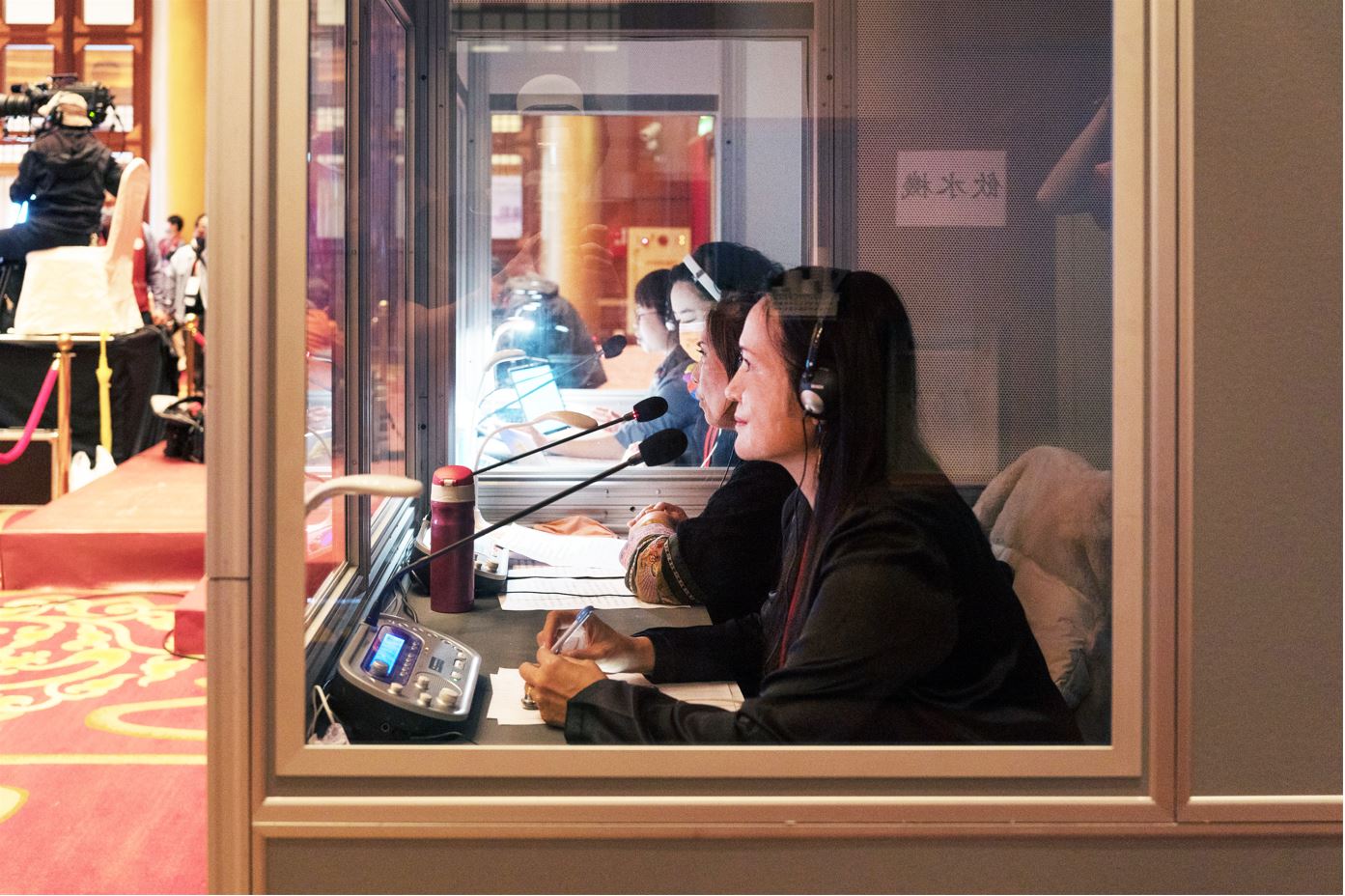Austronesian Forum Secretariat Office held the 2021 Austronesian Forum in Taipei Grand Hotel today, with the opening ceremony and forum general assembly in the morning, and the annual Executive Council meeting with forum members in the afternoon. President Tsai Ing-wen, Premier Su Tseng-chang, and former President Tommy Remengesau of the Republic of Palau all attended the opening ceremony and gave their remarks. Former President Tommy Remengesau also gave a keynote speech as a traditional leader and shared on the traditional leader system in Palau, which was very well-received.
The Austronesian Forum holds biennially a policy conference in different themes, and the theme this year focuses on the traditional leader systems of Taiwan indigenous peoples and Austronesian countries. The traditional leader of the Republic of Palau is invited this year to share their system and experiences with the traditional leaders and elders of Taiwan indigenous peoples.
Chairperson Icyang of the Austronesian Forum Executive Council states in his remark that the traditional leader system in Taiwan has changed with time. By sharing in the forum today the traditional social systems in Taiwan and other countries in the Austronesian region, we hope to work together and seek future developments. A transcript of Chairperson Icyang 's remarks in the Amis Language follows:
Cay Cung-tong, Sin-Cen-Yin Su Yin-cang, i’ayaway a Cung-tong no Pu-liw Kung-he-kwu ci Ley-mong Cyi-su ato dayhiw no kasakitakit, maro’ay a kakerikeridan no Yin-cu-min-cu, tapang no kasa’etal no Yin-cu-min-cu i Tay-wan, o dayhiw no matayalay no Yin-cu-min-cu i kasakowan no Cen-fu, polong no lafang ato palosiyangay maratar, nga’ay ho!
President Tsai, Premier Su, former President Tommy Remengesau of the Republic of Palau, ambassadors and representatives, indigenous traditional leaders, mayors of townships (towns, cities, districts) in indigenous areas in Taiwan, representatives of indigenous administrative organizations in local governments, distinguished guests and friends from the media, good morning everyone!
Mahemek kako anini, o tapang no midemakay toni a nikacacawma’ no Nan-taw Min-cu ko tireng no mako, a mitakos tamowanan papikapot toni a sa’opo^, “ O ’alingay no to’as a kakeridan no Nan-taw Min-cu ato palali’ay to aniniay a Cen-ce” sanay ko tapang no sasowalen, masasipalada’ a malalicay to nano to’as a yofayof no Yin-cu-min-cu ato nikacomahad.
As the chairperson of the Austronesian Forum Executive Council, I'm very honored to be able to invite everyone to the forum general assembly today to discuss and share the status and developments of the traditional social organization of indigenous peoples, with a focus on the theme "Harmonization of Austronesian Traditional Leader System and Modern Politics".
’Ayaw no pinapina^ a mihecaan, pacafayen ako ci Cay-Ing-Wen Cung-tung, miliso’ to adihayay a kitakit no Nan-taw, mikapot to kaacangan no kitakit nangra, tonini a rakat matelong ko fana’ no mako to pisa’icel no Nan-taw a kitakit tono to’as a serangawan ato sakangodo^.
Over the past few years, I accompanied President Tsai Ing-wen on many visits to Austronesian countries and personally took part in important events of our diplomatic allies including their National Day celebrations. During the process, I was deeply impressed by the commitment and respect Austronesian countries pay to their traditional cultures.
Toyanan i, tosa patek ira ko safaw siwa a mihecaan maocor ni Cay Cung-tung kako, a mikotay to Cung-tung a miliso’ to Pu-liw, mikapot to kaacangan no Pu-liw to tosa polo’ ira ko lima a mihecaan a mitukulic, itiya i oya ’ayaway a Cung-tong no Pu-liw ci Ley-mong Cyi-su ko mikeriday to sa’opo. O roma^ i, tenok no dadahalay a ’etal no Nan-taw, Ma-saw-el ato Tu-wa-lu a kitakit i, iraay ko ’alingay no kakeridan no to’as, nga’ayay a malo tanengnengan no mita a minanam.
Among which, I was fortunate to have been appointed by President Tsai in 2019 to visit Palau as the special envoy of the President to attend the National Day celebration of the 25th independence of Palau. The National Day ceremony then was chaired by former President Tommy Remengesau of Palau, who is also present here today. Furthermore, in the vast Austronesian region, countries including the Marshall Islands and Tuvalu also have traditional leader systems which we could learn from.
Itini i Tay-wan safaw enem ko kasasiroma no finacadan no Yin-cu-min-cu, caay kalecad ko ’alingay no ’orip, tinako o Pangcah ko fanacadan ako, iraay ko Kakitaan to mamikerid to niyaro’, ira haca ko ma’edesay a ’alingay “ O kasaselal”, tadamaan ko pikungling ato pisakilac to tayal i kasaselal, pakarongay a selal o mami do^do to pasifana’ no kaka a selal. O mahaenay a pikungling pisilsil to tatayalen i, o a ’imeren no niyah a ma’orip, ta manga’ay a marayray. Nikawrira, malcad to Nan-taw min-cu, o ’alingay no kakeridan no to’as i Tay-wanay a Yin-cu-min-cu i, mafalic ko ’orip i, mafalicay ko likakawa no to’as.
The 16 indigenous peoples in Taiwan each have different social systems in their traditional society. Take my own people, for example, the Amis have Kakit'an (community leader) and a very strict age class system, wherein rigorous training and labor division apply to different age groups, and the younger class must obey the teaching of the older class. It is with such training that the spirit of labor division, responsibility, and discipline of the Amis society can be passed on over the generations. However, just like many of the Austronesian peoples, the traditional leader systems of Taiwan indigenous peoples have also somewhat changed over time.
O roma i, sapipalowadaw no Tay-wan Cen-fu to nikacacawma’ no Nan-taw min-cu, pakani i pitoker ni Cay-Ing-Wen Cung-Tong ato Sin-cen-yin Su-Cen-Cang Yin-cang, mahayda i tosa patek ira ko safaw siwa a mihca ko “ Enemay mihca a pihalaka”, ta ira ko saka tayal ita a yusang ato matayalay a mipalowad to ’etalay no Nan-taw a sowal, dafong, pidafo’an to tayal.
In addition, with support from President Tsai Ing-wen and Premier Su Tseng-chang, the Six-Year Plan was verified and approved by the Taiwan government in 2019 in support of the Austronesian Forum, providing us with a stable budget and manpower to promote the various projects of language and culture, industry, and human resource capacity building in the Austronesian region. With concerted efforts from all forum members, we have also completed many important projects, including the reactivation of the Forum, and the establishment of the Headquarters and the Secretariat Office. Building on this, the ideals of the Austronesian Forum are increasingly being noticed and supported by other countries, with the United States attending the Executive Council meeting in the afternoon for the first time to discuss the promotion of relevant projects.
Sarikoray, aray han ko nani maraayay tayni a kakeridan no to’as, nani ’etalay no Yin-cu-min-cu a Ku-ciw, ato nipikapot no tapang no kasakowan, nanay o nikasa’opo no kakeridan no to’as a kalalicay tona nikacacawma’ anini, masasipafatis to fana’, ma’araw ko nika tahada’oc a comahad ko palafangcal to serangawan no Nan-taw. Aray!
Finally, I would like to thank all the traditional leaders, mayors of townships (towns, cities, districts) in indigenous areas, and local government officials for coming all this way to join us, and I hope that by bringing together the Austronesian traditional leaders in the forum today to share our experiences, we will be able to discover unlimited possibilities for the sustainable development of the Austronesian culture, thank you!
